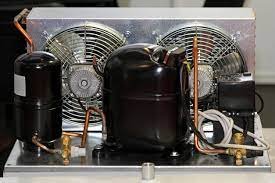When it comes to understanding the essential components of your refrigerator, the compressor plays a pivotal role. Often referred to as the “heart” of the refrigerator, this component is crucial for the appliance’s cooling process. In this detailed guide on TheKitchenApplianceDad.com, we will delve into what a refrigerator compressor does, how it works, and why it’s so important.
What is a Refrigerator Compressor?
A refrigerator compressor is a motorized appliance part located usually at the back or at the bottom of the fridge. It functions primarily to compress and circulate refrigerant throughout the cooling system.
Key Functions of a Refrigerator Compressor:
- Compression of Refrigerant: The compressor increases the pressure of the refrigerant, which is vital for its transformation from a gas to a liquid.
- Circulation of Refrigerant: It helps in circulating the refrigerant through the evaporator and condenser coils, enabling the fridge to dissipate heat from inside to its environment.

How Does a Refrigerator Compressor Work?
The Cooling Cycle
- Compression Stage:
- The cycle begins when the refrigerator thermostat detects a rise in the interior temperature above the set point.
- The compressor then compresses the low-pressure gaseous refrigerant, increasing its pressure and temperature.
- Condensation Stage:
- The high-pressure, high-temperature gas moves to the condenser coils (usually located at the back or beneath the refrigerator).
- Here, the refrigerant dissipates its heat to the surroundings and condenses into a high-pressure liquid.
- Expansion Stage:
- This liquid then passes through an expansion valve or capillary tube, where it experiences a pressure drop and cools further.
- Evaporation Stage:
- The cool, low-pressure refrigerant enters the evaporator coils inside the refrigerator.
- It absorbs heat from the refrigerator’s interior, cooling the stored items.
- The refrigerant evaporates into a low-pressure gas and returns to the compressor to restart the cycle.
Thermostat Regulation
- The entire process is regulated by the refrigerator’s thermostat, which senses temperature changes and signals the compressor to start or stop to maintain the desired coolness.
The Importance of the Compressor in Your Refrigerator
The compressor is not only essential for cooling but also impacts the efficiency and longevity of your refrigerator. Here are some reasons why the compressor is critical:
- Maintains Perishables: By regulating the internal temperature, the compressor ensures that perishable items like food and medicines are preserved properly.
- Energy Efficiency: Modern compressors are designed to be energy-efficient, significantly reducing electricity consumption.
- Durability and Longevity: A good-quality compressor can enhance the overall durability of the refrigerator, ensuring it operates smoothly for many years.
Common Issues with Refrigerator Compressors
While compressors are built to last, they can sometimes face issues that may affect your refrigerator’s performance:
- Overheating: If the compressor overheats, it can shut down, temporarily stopping the cooling cycle.
- Noise: A failing compressor may produce unusual noises such as clicking, buzzing, or humming.
- Failure to Start: Issues like a faulty start relay, capacitor, or thermostat can prevent the compressor from starting.
Preventive Measures:
- Regular maintenance, such as cleaning the condenser coils and ensuring adequate ventilation around your refrigerator, can help prevent these issues.
When to Seek Professional Help
If you suspect that your refrigerator’s compressor is malfunctioning, it’s advisable to consult a professional technician. Some signs that might indicate a need for expert attention include:
- Continuous operation without cycling off
- Unusual noises
- The refrigerator fails to keep food cold
Conclusion
The compressor is indeed the heart of your refrigerator, tirelessly working to keep your food fresh and safe. Understanding how your refrigerator compressor works not only helps in troubleshooting potential issues but also informs your decisions when purchasing a new appliance.
Key Takeaways from TheKitchenApplianceDad.com
- Essential Role: The refrigerator compressor is crucial for the appliance’s cooling cycle, compressing and circulating the refrigerant.
- Operation Cycle: It involves stages of compression, condensation, expansion, and evaporation, regulated by the thermostat.
- Significance: It ensures food preservation, energy efficiency, and enhances the longevity of the appliance.
- Maintenance: Regular maintenance can prevent common compressor issues.
- Professional Help: Recognize when to call a technician to address compressor problems.
By keeping these points in mind, you can ensure that your refrigerator remains in top working condition, providing uninterrupted service to your household. For more insights into caring for your kitchen appliances, keep reading TheKitchenApplianceDad.com.


